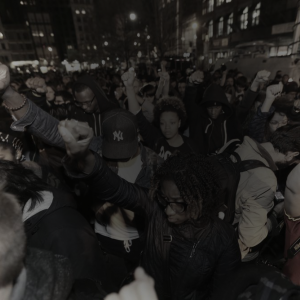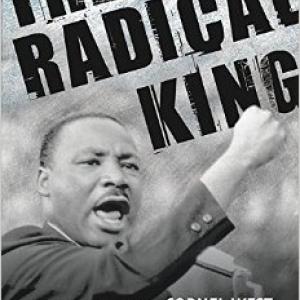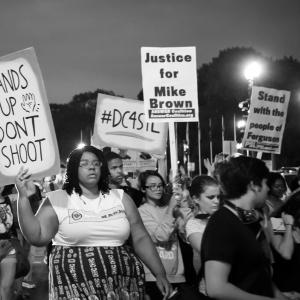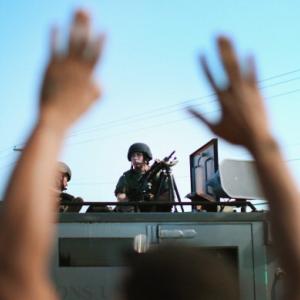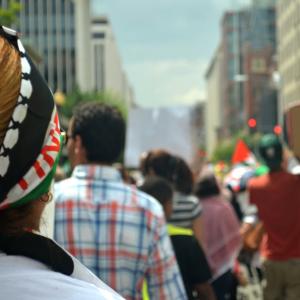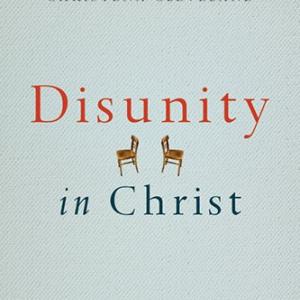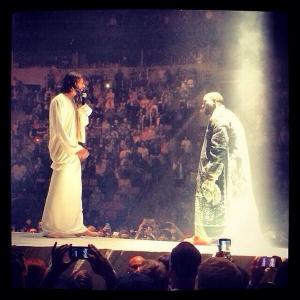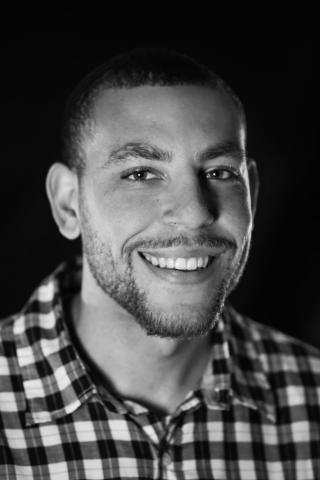
Ryan Herring is a writer, activist, and founder and editor-in-chief of TheGhettoMonk. He is the co-founder of two:fifth, a radical faith movement that seeks to transform our relationships with one another for the sake of building community and ensuring justice. He is the author of the eBook Digital Musings: Reflections Inspired by Tweets.
Posts By This Author
Vanguards of Hope: Why the Black Panthers Documentary Matters Today
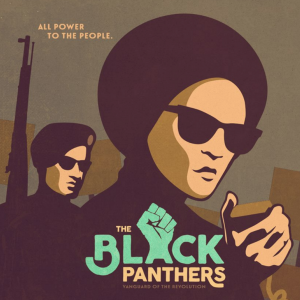
Image via 'Vanguard of the Revolution'/Facebook
The similarities between 1966 and 2016 are frightening. Vanguard of the Revolution serves as a stark reminder that not much has changed in this country for black Americans. But we are here, and we are still fighting, despite knowing the full extent to which the American Empire will go to silence black outrage and destroy black unity. That should make us the vanguards of hope.
The New Creation: How Science Fiction Deepens My Theology
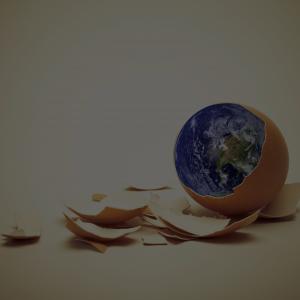
Image via Filipchuk Oleg/Shutterstock.com
I recently picked up a fascinating book called Octavia's Brood co-edited by Walidah Imarisha and adrienne maree brown.
In a discussion about the book, Walidah Imarisha said, "All organizing is science fiction. What does a world without poverty look like? What does a world without prisons look like? What does a world with everyone having enough food and clothing look like? We don't know. It's science fiction, and it is as foreign to us as the Klingon homeworld."
I had never heard of organizing being discussed in such a way, and it led me to reflect on the importance of envisioning and dreaming of the kind of society we fight to create. I also found myself reflecting on this statement in a different light: All organizing is also theological and spiritual. A simple explanation of this is that organizing and activism is faith in action.
'Now is a Time for Theology to Thrive'
AUG. 9, 2014, is a day I’ll never forget. It was the day that Michael Brown was killed by Ferguson, Mo. police officer Darren Wilson.
For many young people in the United States, especially those of us involved in the Black Lives Matter movement, this was our Sept. 11. We all remember exactly where we were and what we were doing when the news broke of another police-involved killing of an unarmed black citizen.
I was in the final days of a yearlong internship with Sojourners. My fellow interns and I were on our closing retreat in West Virginia. I was on my phone checking my Twitter timeline when I began to see retweets of images: Michael Brown laid out on Canfield Drive with blood still leaking from his bullet wounds. I remember the anger that instantly came over me. “Not another one!” was all I could think.
As the day wore on, I felt frustrated that I was stuck in a retreat house, forced to sit idly by while the grieving community in Ferguson was antagonized by officers in riot gear with police dogs. I knew then that I had to do whatever it would take to join the people in this fight for justice. I never imagined how this movement would change the way I—and many others—actually do theology.
Fighting for Justice: A Commitment to Wait on the Lord

Image via Lukas Maverick Greyson/Shutterstock
But what does it mean to wait on the Lord? We are actually waiting, in a chronological sense, because as humans we are bound by time. But was there more to what the prophets meant by this?
When asked about the prophet's insistence on waiting on the Lord my father's response was, "...In general they are imploring us to not get our desires ahead of God's intentions. Alignment between our will and God's design is critical for our work to bear fruit. Therefore, it is not a temporal wait, but a plea to put God's will first."
This perspective frees us from the bondage of our impatience, because it becomes less about when and more about how. Waiting on the Lord is not something done passively. Much action is demanded from us. The Hebrew words used to mean "to wait" in passages such as Isaiah 30:18, Micah 7:7, and Habakkuk 2:1-3 could also be used to mean "to put hope in."
Reclaiming the Prophetic Edge
“WE ARE AT the moment when our lives must be placed on the line if our nation is to survive its own folly.”
Martin Luther King Jr. gave this stinging critique of the apathetic nature of both the U.S. church and the general public more than 40 years ago. While some things have changed for the better, the truth remains that the three evils of society that King named (racism, militarism, materialism) continue to pervade U.S. culture, crippling our moral and ethical foundation.
It is difficult to imagine that someone the FBI once labeled as “the most dangerous man in America” would one day have his own national holiday. Each year we celebrate the life of King with an incomplete and romanticized retelling of the impact he had on society during and after the civil rights movement. He dreamed of a better nation, but what was it about his dream that made him a nightmare to the U.S. government?
Reviving the Flame
CORNEL WEST and Christa Buschendorf have collaborated to bring forth a powerful look at the visionary legacies of 19th- and 20th-century African-American leaders. Black Prophetic Fire consists of six conversations between West and Buschendorf, each one focusing on a different black prophetic figure: Frederick Douglass, W.E.B. Du Bois, Martin Luther King Jr., Ella Baker, Malcolm X, and Ida B. Wells. In the book, West displays his wealth of knowledge and understanding of those prominent historical black icons and their movements.
For West, U.S. society has arrived at a pivotal point. He sees the “black embrace of the seductive myth of individualism in American culture” as reason enough to ask tough reflective questions such as, “Are we witnessing the death of black prophetic fire in our time?” and “Have we forgotten how beautiful it is to be on fire for justice?”
West is known as an intellectual and activist who loathes the unfair treatment of people anywhere, regardless of their race, gender, sexual orientation, or religious creed. His message of love, particularly for the younger generations, becomes the undertone of this book. Throughout the years, the black prophetic tradition has seen a decline in exemplars of integrity. West presents the conversations he had with Buschendorf as a history lesson and a call to younger generations to not let this tradition fizzle out.
VIDEO: A Dream Deferred in Ferguson
Ryan Herring reads Langston Hughes' "Harlem" as photos of Ferguson are displayed.
'Hands Up! Don't Shoot!'
ON AUG. 9, Michael Brown, an unarmed black teenager, was shot to death by Ferguson, Mo., police officer Darren Wilson. A collective groan was let out across social networks—people began the lament “Not again.”
Just four days prior, John Crawford III, a 21-year-old black man, had been gunned down by police in a Walmart in suburban Dayton, Ohio, without warning, while shopping for a BB gun. A few weeks earlier, Eric Garner, an African-American man, was choked to death by a New York City police officer.
For young black men, each incident is a reminder of how easily our lives can be taken away by police aggression. For the people in Ferguson, however, over-policing is all too familiar. In a city where 67 percent of the residents are black, there are only three black police officers on a force of 53.
A 2013 report from the Missouri attorney general’s office revealed just how bad relations are between officers and black citizens. Out of the 5,384 traffic stops made last year by the Ferguson Police Department, 86 percent of them targeted black drivers. Black drivers were searched and arrested at nearly twice the rate of white drivers, although contraband was found at a rate 13 percent less than that of white drivers.
When Terror Wears a Badge
Over the past three weeks there have been four separate incidents that have led to the deaths of four unarmed black men at the hands of police. For many black people, myself included, the moments following these tragic events are filled with despair, sorrow, anger, and frustration. Each incident serves as a reminder that as a black man in America, my life holds little to no value in the eyes of the general public. To be young and black in the United States means to live under constant pressure, something most non-black American citizens know nothing about.
For the majority of black people, the police do not represent protection or safety, rather they are a menacing force that terrorize those they are supposed to serve. I have never felt safe in the presence of law enforcement. In fact, whenever police are in close proximity to me, I feel in danger. Whenever a cop drives behind me or beside me I feel anxious, not protected.
Is my paranoia justified?
'Silence Is Betrayal:' Speaking Out for Peace
Saturday marked the third time since Israel began military operations in Gaza on July 8 that I let my voice be heard. I stood and marched alongside some 20,000 other individuals that like me have become utterly disgusted by what is unfolding in the Middle East.
A cease-fire has been struck, but as of yesterday, at least 1,800 Palestinians, most of whom are civilians, have been killed and nearly 7,000 have been wounded. Another 200,000 have been displaced in a territory whose infrastructure is now in ruins with mass power and water outages.
Despite the horrific events that have happened halfway across the world, the protest last Saturday, which took place at the White House, was a beautiful sight. Among the 20,000 protesters were Muslims, Jews, and Christians. There were blacks, whites, Arabs, Asians, and Latinos. There were women and men, both young and old, who had come from cities like Chicago, Tampa, Baltimore, and Boston. Many barriers were broken as we stood and marched in solidarity with the people of Palestine.
There were times when my heart was completely broken as I saw signs with photos of dead and mutilated bodies and others that listed the names and ages of children who had been killed by Israeli airstrikes. But in those same moments I would look across the sea of protesters draped in black, white, green, and red yelling phrases such as "Free, Free Palestine!" and "Stop the killing, stop the hate!" and I would once again become a prisoner of hope. I take refuge in the rock that is Christ Jesus. I know my God stands with those being oppressed, with those seeking justice and peace. I know my voice and prayers along with millions of others around the world will be heard.
Although I am pro-Palestine, that does not make me pro-Hamas or anti-Israel. I recognize and condemn Hamas's involvement in the failed peace talks and inability to find solutions. I also mourn equally for the loss of life on the Israeli side. However, despite the part Hamas has played in all of this I do not find Israel's actions to be justified. So I march.
Breaking Down the Invisible Walls
OVER THE PAST 2,000 years, Christians have found myriad ways to divide the body of Christ. We are now more divided than ever, with more than 40,000 Christian denominations worldwide. Perhaps, in this context, we are asking the wrong questions. Do we really understand God’s desire for the church to be one? Do we as individuals have a yearning for the unification of the body of Christ? Why do we create the divisions we create? Why do we maintain the divisions that already exist? How can we break through these barriers to heal a broken church?
Christena Cleveland sets out to answer all of these questions and more in her latest book, Disunity in Christ. Cleveland is a young, energetic, and brilliant teacher, speaker, and researcher in the fields of social psychology and faith and reconciliation. For those concerned with reconciliation in the church, which should be all of us, hers is a voice to take seriously.
In Disunity, Cleveland quickly breaks the ice by poking fun at herself and by pointing to her own personal prejudices and biases that have led to her categorically labeling fellow brothers and sisters in Christ as either a “right Christian” or “wrong Christian.” The reader is immediately able to connect with her and realize the ways in which we have created division in our own lives, whether because of race, gender, orientation, education, location, socio-economic status, theology, or political affiliation. It also becomes apparent why we prefer our homogenous groups.
Supporting Cast: Why We Need to Be More Patient and Forgiving
I had the idea for this blog post a couple weeks ago, but I thought it best to wait until around this time to release it. Just two weeks into the new year, this is usually the stage in which people are slowly becoming less committed to their resolutions.
I know there is much disdain for the phrase "new year, new me." We all have family and friends who commit themselves to something on January 1st, whether it be to exercise more, eat healthier, become a better Christian, etc., and just days into the new year they have already failed to live out those commitments. The phrase probably should be "new year, same old me." This post is not intended to stroke the ego of our skeptics, rather, Lord willing, it will serve as encouragement to those who strive to better themselves.
Although we struggle to stay faithful to our new found endeavors, thankfully we serve a God who is both patient and forgiving. Psalm 86:15 states, "But you, O Lord, are a God merciful and gracious, slow to anger and abounding in steadfast love and faithfulness."
Hollywood: Whitewashing the Bible
Following the success of the History Channel's mini-series, The Bible, which appeared weekly last March, Hollywood seems to have renewed an avenue in which Biblical adaptations are allowed to enjoy a significant amount of limelight.
Two blockbuster titles are to set to be released in 2014: Paramount Picture's Noah and 21st Century Fox's Exodus. These two films both boast a star-studded cast as directors Darren Aronofsky and Ridley Scott hope to astonish audiences by combining stunning visualizations with two of the most popular accounts from the Old Testament, the Great Flood and the Exodus out of Egypt.
As a Christian and an avid movie-goer, I was thrilled to read that these two films were in production. However, once I saw the actors cast to play the leading roles in these two films, my excitement quickly turned to disdain. Not a single one of the leading roles in either movie was given to a person of Middle Eastern descent.
The God of Rap
On the opening night of the Yeezus Tour, multi-platinum, Grammy award-winning rapper Kanye West brought out an actor to portray Jesus during his concert in Seattle. Most of the time when I see "White Jesus" depicted, I don't get offended because I don't find it to be historically accurate. But between this and the title and theme of Kanye's last album, Yeezus, I was initially fed up. His antics were disrespectful, offensive, and just plain unnecessary.
Before I began to write this post I searched for concert footage of the event, but I stumbled upon an interview Kanye had with Wild 94, a hit music station in San Francisco. During the interview, which was done a few days after his Seattle performance, he was given the opportunity to explain his motives behind bringing out Jesus.
"We do plays all the time. People play Jesus,” West said. “You know what’s awesome about Christianity is we’re allowed to portray God. It’s a painting, it’s a sculpture, it’s a moving opera, it’s a play, it’s a message. God knows where my heart is at.”
Then came the comment that changed the entire direction of this post:
“One of the things that I really wanted to get across is that you can have a relationship with Jesus. That you can talk to Jesus. This is the way I express it.”
